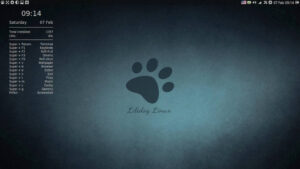FOSS Week in Review
While Larry’s on the West Coast, where it’s never too hot nor too cold, on a brief educational sabbatical, burning the midnight oil while cramming to increase his Linux skills, I’m in North Carolina where it’s not often too cold — at least in my part of the state — but where in summer heat and humidity conspire to make life miserable for homo sapiens. Thankfully, September has arrived, so we’re hopeful that the temps and moisture will soon drop to tolerable levels.
 Meanwhile, in the world of free tech…
Meanwhile, in the world of free tech…
Elementary OS steps up: Not quite four months after the release of version 0.3.0 Freya, the folks at elementary have announced the release of 0.3.1. Although this is officially a minor point release, it does come packed with changes that should make it a must-install for elementary users. Included in the update: Version 14.04.3 of Ubuntu’s Hardware Enablement stack, improvements to the interface in Files, and the latest and greatest version 0.5.11 of the Midori browser.
It would seem from reading the distro’s website that the developers are particularly pleased with the new hardware stack:
“It includes…an updated Mesa that fixes the dreaded ‘double cursor’ glitch. Workspaces in the Multitasking view also now work properly on Nvidia Optimus. The new hardware stack also brings better support for backlights and touchpads on certain laptops, a host of performance and power-related improvements, and support for 5th generation Intel processors. This release should also improve support for (U)EFI systems, especially when installing without an internet connection.”
By design, elementary OS with its homegrown Pantheon desktop isn’t very configurable. It’s meant to be an extremely easy to learn and use distro, especially for those making their first move to Linux from Windows. According to the elementary OS website, there have so far been an estimated five million downloads of the distro, with 70 percent being initiated on Windows and OS X machines.
Remember, every time a user moves from Windows to Linux, we all benefit.
![]() Chrome turns seven: Has it really been seven years since Google unleashed the Chrome browser on the public? If I may be excused for the cliche: It seems like only yesterday.
Chrome turns seven: Has it really been seven years since Google unleashed the Chrome browser on the public? If I may be excused for the cliche: It seems like only yesterday.
At first, the browser had us scratching our collective heads and wondering why, since early versions weren’t much more than rebranded versions of Firefox. The “why” question was answered with haste, however, as Chrome quickly morphed into a browser with deep hooks into Google’s ecosystem. To be sure, the browser offers many things to like in the way of convenience, but the privacy issues that come with Chrome sometimes make using it seem like something of a deal with you-know-whom. The public evidently doesn’t care, as it’s the world’s most used browser.
Yesterday, Datamation reported that on the day of Chrome’s birthday, September 2, Google released Chrome stable version 45 and Chrome beta 46.
“With Chrome 45, much of the focus is on security fixes which are patched in the browser. In total, Google says it patched 29 security flaws with Chrome 45, of which at least nine were reported by external third party researchers.”
The Datamation article goes on to report that Google paid the third party researchers reporting the nine bugs a total of $40,500 in bounty money.
Version 46, that’s now out in beta, will focus on performance issues.
“One of the biggest performance bottlenecks for any browser is loading times for a page, which can be the result of images or autoloading of video. Both of those issues are being addressed in Chrome 46.
“Chrome 46 introduces new capabilities that enable website developers to help the browser to load the best image size for a given client. Additionally there is now a preconnect feature, which is also intended to improve performance.”
Anyway, happy birthday Chrome. It’s good to see you’re improving on performance and keeping up on security. Now, if you’d just address those privacy issues…
All Things Open getting geared up: On Wednesday, Larry Cafiero wrote about the preparations going on in Columbus, Ohio as Ohio LinuxFest (OLF) 2015 gets ready for the big show slated to begin on October 2. This week, we were reminded by the folks at All Things Open (ATO), the Raliegh, North Carolina based open course conference we like to think of as the OSCON of the East Coast, that they haven’t been sitting on their laurels either:
“On Monday, October 19, the award-winning documentary ‘Code: Debugging the Gender Gap’ will be shown to conference attendees and the general public over lunch, courtesy of Red Hat. Immediately following the screening, a world-class panel comprised of leading open technology and subject matter experts will discuss the film and the issues it highlights. For more information, go here.”
 The panel discussion will include Red Hat’s DeLisa Alexander as moderator, Caroline Simard with Stanford University’s Clayman Institute for Gender Research, Nithya A. Ruff with SanDisk and John William Templeton with Venturata Economic Development Corp.
The panel discussion will include Red Hat’s DeLisa Alexander as moderator, Caroline Simard with Stanford University’s Clayman Institute for Gender Research, Nithya A. Ruff with SanDisk and John William Templeton with Venturata Economic Development Corp.
All Things Open will be held on October 19-20 at the Raleigh Convention Center and will feature over 100 speakers. For more information on this year’s ATO, visit the conference’s website.
Well, that does it for now. Larry will return next week. Until then, may the FOSS be with you…
Help keep FOSS Force strong. If you like this article, become a subscriber.
Christine Hall has been a journalist since 1971. In 2001, she began writing a weekly consumer computer column and started covering Linux and FOSS in 2002 after making the switch to GNU/Linux. Follow her on Twitter: @BrideOfLinux














@Christine,
Those who opt to use Chrome should understand that it IS NOT open source.
Chromium is.
Right now, I am back to Firefox, but that can change the next time they decide to disallow any videos to play within their borders. It only lasted for about 2 releases, but in those two releases, I was reminded of why I fled Chrome in the first place.
I mean, it’s ok…it gets the job done. But between memory being sucked out of it like a star rendered by a black hole and the on and off again blocking of some of my favorite addons, I decided that Chrome was best used as a backup browser. I and my organization are fully head-on invested (trapped) within the Googlesphere so trying to quell any privacy concerns in Chrome is like trying to stamp out a camp fire with the forest raging 50’flames all around you.
And that’s the price we pay for having a “mobile solution” at all of our campfires. Do we recommend Google et al to our reglue kids? Yes, but with caveat. We teach them about FOSS and why it is more critical than ever to embrace it. But we also tell them we live in a google-fied world and that becoming familiar with it is a smart move from an employer’s POV.
There’s a price we pay for the convenience of living in the Googlesphere. It’s up to us to decide how much to pay the piper.
@Ken
Where FOSS principles are concerned, yours is a ‘rationalization’.
Either we stand for FOSS or we don’t.
There’s no such thing as being ‘a little bit pregnant’. 😉
Seems like people are waking up. My one and only complaint with
this site is how often MS is the subject of articles. Maybe a
second site called MSForce?
MicroSoft and Google (Alphabet) are not FOSS. Not now and not
ever.
FOSS